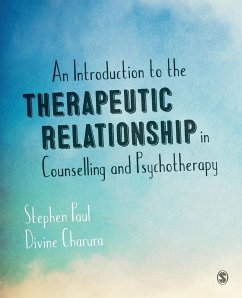
Gebundenes Buch
Understanding Mental Health and Counselling (First Edition)
Versandkostenfrei!
Versandfertig in 1-2 Wochen

PAYBACK Punkte
86 °P sammeln!




AÂ critical introduction to key debates about how problems of mental health are understood, and to the core approaches taken to working with counselling and psychotherapy clients.
Naomi Moller is Associate Head of Department in the Department of Social Science at the University of the West of England, Bristol. A counselling psychologist by training, Naomi is also a trainer on UWE's counselling psychology and counselling programmes. Her primary research interests are in the areas of psychotherapy research and training, with a special interest in diversity and attachment. She has published various journal articles, is a reviewer for several psychotherapy journals and is a member of the Editorial board of BACP's Counselling and Psychotherapy Research journal. Naomi has a deep belief in the value of research for counseling and psychotherapy practice. Andreas Vossler is Director of the Foundation Degree in Counselling and Senior Lecturer in Psychology at the Open University. He is also a systemic trained couple and family psychotherapist. His current research activities focus on therapeutic work with couples and families, infidelity, Internet infidelity, and counselling and psychotherapy. Andreas is co-editor of the Counselling and Psychotherapy Research Handbook (2014) and Understanding Counselling and Psychotherapy (2010; both Sage). He has authored three textbooks and published 17 book chapters and 19 articles in peer-reviewed papers on topics related to counselling and psychotherapy (family therapy, infidelity, online counselling, health psychology, psychiatry) and research methods. Andreas is on the editorial board of Counselling Psychology Quarterly and Forum Community-Psychology.
Produktdetails
- Published in Association with The Open University
- Verlag: SAGE Publications Ltd
- Seitenzahl: 648
- Erscheinungstermin: 7. Oktober 2020
- Englisch
- Abmessung: 252mm x 194mm x 39mm
- Gewicht: 1504g
- ISBN-13: 9781529712285
- ISBN-10: 1529712289
- Artikelnr.: 59503970
Herstellerkennzeichnung
Libri GmbH
Europaallee 1
36244 Bad Hersfeld
gpsr@libri.de
Für dieses Produkt wurde noch keine Bewertung abgegeben. Wir würden uns sehr freuen, wenn du die erste Bewertung schreibst!
Eine Bewertung schreiben
Eine Bewertung schreiben
Andere Kunden interessierten sich für











